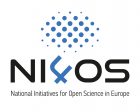Since 2017, Serbia has witnessed an intensive development of institutional repositories. The process was boosted by the adoption of the Open Science Platform in 2018.
Repositories in Serbia are predominantly powered by DSpace and most of them have been developed by the Repository Development Team at the University of Belgrade Computer Centre (TRAP-RCUB). (Read more about the Policy for Transparent Access to Research Infrastructures at the Computer Centre of the University of Belgrade: TRAP-RCUB IT solution and organizational model for the implementation of institutional or thematic repositories)
The expertise gained through EU projects has provided guidance in achieving technical interoperability (OpenAIRE Advance) and compliance with FAIR principles and EOSC requirements (NI4OS-Europe). This post summarizes the work in this direction done by the University of Belgrade Computer Centre in 2021.
FAIR principles and repository certification
Repository certification was on the agenda of the TRAP-RCUB team early on, but the local expertise to prepare a certification application was lacking. In 2020, the call for repository certification support launched by the SSHOC project provided an opportunity to get the necessary support and make progress in this area. DAIS – Digital Archive of the Serbian Academy of Sciences and Arts was selected by the SSHOC project team to receive support in reaching CoreTrustSeal certification. The TRAP-RCUB team was guided through the process of preparing the CoreTrustSeal application by two experts from the SSHOC network – Birger Jerlehag (Swedish National Data Service) and Daan Broeder (Royal Netherlands Academy of Arts & Sciences). The application was completed and submitted early in December 2021.
Not only that the prepared repository documentation, including detailed about sections and policies, could serve as a model for other repositories, and that the TRAP-RCUB team will do their best to assist repository managers in Serbia and in the NI4OS-Europe partner countries interested in reaching certification, but this effort has also boosted the FAIRification of repositories in Serbia, primarily through the implementation of persistent identifiers. This was possible thanks to the support provided by the NI4OS-Europe coordinator – GRNET (Read more about GRNET’s PID Service . So far, persistent handles have been implemented in three repositories in Serbia (NaRDuS – the national repository of PhD theses, and two institutional repositories – DAIS and Cherry). PIDs will be gradually implemented in all repositories developed by the University of Belgrade Computer Centre and the priority will be given to those archiving research data.
Content diversity
The implementation of PIDs will certainly encourage an interesting trend observed in Serbia over the past year: a growing interest in depositing research data in institutional repositories, rather than using Zenodo or figshare. The non-technical potential of institutional repositories in Serbia to archive various content types, beyond publications, was analyzed in a research conducted in the summer of 2021. The results were presented at the PUBMET 2021 Conference, in the invited talk entitled Beyond Open Access mandates: institutional repositories as building blocks in open scholarly communication (presentation: https://doi.org/10.5281/zenodo.5786271).
In brief, a number of institutions in Serbia use institutional repositories as archives that pool together a wide variety of research outputs and repository managers are the key enablers in this process. However, poor interest on the part of researchers and the lack of government support for Open Science infrastructure and activities are considerable challenges.
Training
The adoption of FAIR principles and good practice is ensured through training. Over the past four years, the University of Belgrade Computer Centre has been offering a complex training programme for repository manages and researchers.
This concept of this training programme was presented at the First International Online Conference on Digital Transformation in Culture and Education (14-16 April 2021) in the presentation entitled TRAP-RCUB IT Solution and Organizational Model for the Implementation of Institution or Thematic Repositories – User support for librarians and researchers.
In the lightning talk entitled Building capacity for Open Science through training for institutional repositories at the OS fair 2021, it was shown how training related to repositories contributed to the development of skills relevant for Open Science.
The University of Belgrade Computer Centre also shares its expertise with other institutions developing repositories. In May 2021, a webinar on copyright and self-archiving policies for the academic, research, and research support staff of the University of Kragujevac was organized.
Visibility and Interoperability
All repositories developed by UoB are registered in OpenDOAR and interoperable with a number of aggregators, including OpenAIRE, BASE, CORE and WorldCat. However, this is not the case with other repositories in Serbia: while some are registered with OpenDOAR and harvested by BASE and CORE, none are integrated with OpenAIRE. To encourage institutions to meet the technical requirements and submit their repositories for harvesting, the TRAP-RCUB team organized a webinar on 27 October 2021, during the International OA Week, where submission procedures were explained in detail. The presentation also included a demonstration of RePol. A number of repositories do not have policies and this tool developed by NI4OS-Europe could facilitate the process of defining them.
